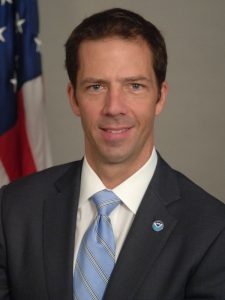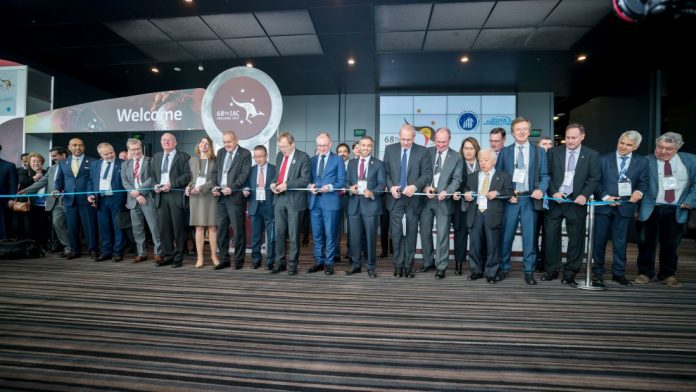The International Astronautical Congress (IAC) is the world’s largest gathering of space professionals. It is that one time of the year when all space actors come together from around the world. Global, multidisciplinary and covering all space sectors and topics, it offers everyone access to the latest space information and developments, but more importantly, it provides an opportunity for networking and potential partnerships. Each year, the IAC changes its host country, theme and local organiser, enabling all to learn more about, and be a part of, the world space scene. This year, the IAC will be held in Washington D.C, U.S.A from October 21-25, 2019.
With a record-breaking number of 4,336 abstracts submitted for review, the 2019 IAC will feature 2,440 paper presentations in 5 categories. The 2019 Technical Programme will consist of more than 2,070 oral presentations in 181 diverse Technical Sessions (including 5 Global Technical Sessions) and 360 interactive presentations highlighting recent progress in all major areas of the global space industry.
During the Congress, all space players will gather to discuss the advancement and progress of space in its various facets. In particular, this year the IAC will commemorate that “one giant leap for mankind”, the 50th anniversary of a feat once thought impossible – humans walking on the moon – and celebrate the international accomplishments and partnerships that have become the hallmarks of space exploration. The IAC 2019 will involve everyone offering a rich programme of Plenaries, Highlight Lectures, Technical lectures as well as a Global Networking Forum and many social events abundant in networking opportunities.
Highlight Lecture 1 – MARSIS: the Successful Search for Liquid Water on Mars

On Tuesday October 22 2019, in the frame of the IAC Industry Day, from 18:00 – 19:00, the Congress will feature a Highlight Lecture by Enrico Flamini, Former Chief Scientist, Italian Space Agency (ASI) on a topic titled ‘MARSIS: the Successful Search for Liquid Water on Mars’.
Overview of the Highlight Lecture 1
The recent finding of evidence of the presence of liquid water in the depths of the Martian South Polar Layered Deposits occurs after almost a decade of analysis of the data produced by the two Italian lead sounding radar around Mars. The case for Mars is intriguing due to the role that water has surely played in the shaping of the present state of the planet, and for the role that the presence of water plays in the possible resurgence of life forms. Water, liquid or as ice, is a central element for the future of Mars exploration, being the main resource needed in the case of human exploration. Sounding radars are now considered the best technology to remotely assess the presence, amount and nature of water ice under the Martian surface. Radars are key instruments for the present and future of planetary exploration.
Highlight Lecture 2 – The Challenge of Exploring Our Sun: the 60-Year Odyssey to Parker Solar Probe

The Congress will feature on Wednesday, 23 October from 18:00 – 18:45, the second Highlight Lecture by Nicola J. Fox, Division Director, Heliophysics Division, Science Mission Directorate, National Aeronautics and Space Administration (NASA) on the topic of ‘The Challenge of Exploring Our Sun: the 60-Year Odyssey to Parker Solar Probe’.
Overview of the Highlight Lecture 2
The Parker Solar Probe is humankind’s first mission to venture to the Sun and unlock the mysteries of the corona. Launched in 2018, and built by JHUAPL for NASA, this mission is the culmination of a 60-year quest to build a spacecraft and instruments capable of exploring the searing temperatures and radiation of the corona, and investigate the processes that drive the solar wind. While a mission to the Sun has been a scientific priority since 1958, it was not a possibility until recently, due to the extreme radiation environment close to the Sun. Parker and its instruments will come within 3.8 million miles (6.16 million kilometres) to the Sun, more than seven times closer than any spacecraft has come before. Initial data from the instruments have revealed previously unobserved processes in the near-solar region; highlights of the first major scientific findings will be presented at IAC.
Highlight Lecture 3 – Monitoring Coastal Waters from Space
Highlighting the Chesapeake Bay Region: Dramatic Advances Enable Better Understanding and Protection of these Vital Ecosystems, and their Immense Coastal Populations and Infrastructure

On Wednesday October 23, 2019 from 19:00 – 19:45, the Congress will feature the third Highlight Lecture by Neil Jacobs, Assistant Secretary of Commerce for Environmental Observation and Prediction, National Oceanic and Atmospheric Administration (NOAA), on the topic “Monitoring Coastal Waters from Space – Highlighting the Chesapeake Bay Region – Dramatic Advances Enable Better Understanding and Protection of these Vital Ecosystems, and their Immense Coastal Populations and Infrastructure”.
Overview of Highlight Lecture 3
Earth’s coasts play an ever-increasing role in the economy of nations, ecology of oceans and health of both. Nearly 40% of the world’s human population lives within 100 km of a coast, and coastal waters are critically important for fisheries, aquaculture, recreation, transportation and tourism. Yet, the coastal waters are under severe stress. This meeting of freshwater, saltwater and land is a vital junction of ecologic and economic policy, public safety and climate. All must be balanced for a healthy ecosystem, economy and society. Advances in our ability to monitor coastal areas from space and the ability to effectively use that information for policy making, public safety, infrastructure protection, coastal and ecosystem management is critical to achieving a healthy balance. Highlighting the Chesapeake Bay area surrounding Washington D.C, this session will show how Earth Observation from space is advancing to meet informational needs to address coastal challenges for societal benefit.
Plenary and Technical Sessions
There would also be a plenary session on Wednesday October 23, 2019 between 8:30 a.m and 9:30 a.m, which would take place at the Grand Ballroom B of the Walter E. Washington Convention Centre. It would be moderated by Pontsho Maruping, Chair of the Scientific and Technical Committee, United Nations Office for Outer Space Affairs (UNOOSA), South Africa. The plenary session, which focuses on the benefits of space technology to emerging nations as well as the importance of collaborations, would feature the following speakers: Anond Snidvongs (Executive Director, Geo-Informatics and Space Technology Development Agency, Thailand), Carlos Augusto Teixeira de Moura (President, Brazilian Space Agency), Halilu Ahmad Shaba (Acting Director General / Chief Executive, National Space Research and Development Agency, Nigeria), Mohammed Nasser El Ahbabi (Director General, United Arab Emirates Space Agency) and Valanathan Munsami (CEO, South African National Space Agency).
IAC 2019 will also offer an extensive and multidisciplinary Technical Programme that reflects the diversity of disciplines within space. Following its usual style, the congress will span a full week, with 180 technical sessions (including 5 Global Technical Sessions), more than 2,000 oral presentations, more than 400 interactive presentations, 19 special sessions and 27 keynote lectures.
The Technical Sessions consist of more than 2,000 oral presentations logically grouped into several concurrent sessions with major categories in Science & Exploration, Applications & Operations, Technology, Infrastructure, Space & Society. All papers will be screened by members of the International Programme Committee prior to acceptance to maintain high technical standards and relevance to the session topic.
The Special Sessions offer key insight into new and emerging topics of particular interest to the space community that will also cut across disciplines traditionally represented. The specific formats of the Special Sessions (panels, debates, workshops, etc) favour highly interactive discussions and exchange of ideas. The IPC Steering Group selects proposals which stress the novelty of the topic and its multidisciplinary flavour, which will provide a complementary experience compared to the regular Technical Sessions.
There would also be Global Technical Sessions, which are designed to offer a modern and eclectic platform at the IAC for sharing technical content to an open-minded audience. Oriented towards young and talented space professionals, it allows for sharing of information on a global scale with presenters and audience both at the IAC venue and at their respective home/work/university locations. The Global Technical Sessions are similar to the conventional technical sessions, with abstract selection and paper submissions. They are jointly organised by associated technical committees and co-chaired by seasoned experts and young professionals, in order to stimulate the interaction with the authors. The Global Technical Sessions are the IAC cradle for future talents and a modern session to speak with a larger audience, thanks to the real-time broadcast online.
More information about IAC 2019 is available on the Conference website.
Space in Africa is an Official Media partner for IAC 2019.






